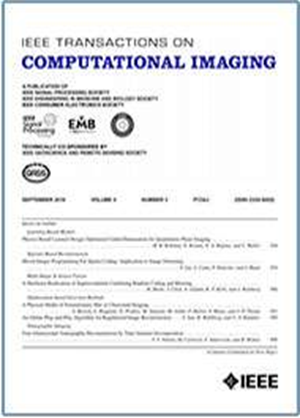Adaptive Local Neighborhood-Based Neural Networks for MR Image Reconstruction From Undersampled Data
IF 4.2
2区 计算机科学
Q2 ENGINEERING, ELECTRICAL & ELECTRONIC
引用次数: 0
Abstract
Recent medical image reconstruction techniques focus on generating high-quality medical images suitable for clinical use at the lowest possible cost and with the fewest possible adverse effects on patients. Recent works have shown significant promise for reconstructing MR images from sparsely sampled k-space data using deep learning. In this work, we propose a technique that rapidly estimates deep neural networks directly at reconstruction time by fitting them on small adaptively estimated neighborhoods of a training set. In brief, our algorithm alternates between searching for neighbors in a data set that are similar to the test reconstruction, and training a local network on these neighbors followed by updating the test reconstruction. Because our reconstruction model is learned on a dataset that is in some sense similar to the image being reconstructed rather than being fit on a large, diverse training set, it is more adaptive to new scans. It can also handle changes in training sets and flexible scan settings, while being relatively fast. Our approach, dubbed LONDN-MRI, was validated on multiple data sets using deep unrolled reconstruction networks. Reconstructions were performed at four fold and eight fold undersampling of k-space with 1D variable-density random phase-encode undersampling masks. Our results demonstrate that our proposed locally-trained method produces higher-quality reconstructions compared to models trained globally on larger datasets as well as other scan-adaptive methods.基于自适应局部邻域的神经网络用于从欠采样数据重建磁共振图像
最近的医学图像重建技术侧重于以尽可能低的成本生成适合临床使用的高质量医学图像,并尽可能减少对患者的不良影响。最近的研究表明,利用深度学习从稀疏采样的 k 空间数据重建磁共振图像大有可为。在这项工作中,我们提出了一种技术,通过在训练集的小型自适应估计邻域上拟合深度神经网络,在重建时直接对其进行快速估计。简而言之,我们的算法交替搜索数据集中与测试重构相似的邻域,并在这些邻域上训练局部网络,然后更新测试重构。由于我们的重建模型是在与被重建图像在某种意义上相似的数据集上学习的,而不是在一个大型、多样化的训练集上拟合的,因此它对新扫描的适应性更强。它还能处理训练集的变化和灵活的扫描设置,同时速度相对较快。我们的方法被称为 LONDN-MRI,使用深度非卷积重建网络在多个数据集上进行了验证。利用一维可变密度随机相位编码欠采样掩码对 k 空间进行了四倍和八倍欠采样重建。结果表明,与在更大数据集上全局训练的模型以及其他扫描自适应方法相比,我们提出的局部训练方法能产生更高质量的重建。
本文章由计算机程序翻译,如有差异,请以英文原文为准。
求助全文
约1分钟内获得全文
求助全文
来源期刊

IEEE Transactions on Computational Imaging
Mathematics-Computational Mathematics
CiteScore
8.20
自引率
7.40%
发文量
59
期刊介绍:
The IEEE Transactions on Computational Imaging will publish articles where computation plays an integral role in the image formation process. Papers will cover all areas of computational imaging ranging from fundamental theoretical methods to the latest innovative computational imaging system designs. Topics of interest will include advanced algorithms and mathematical techniques, model-based data inversion, methods for image and signal recovery from sparse and incomplete data, techniques for non-traditional sensing of image data, methods for dynamic information acquisition and extraction from imaging sensors, software and hardware for efficient computation in imaging systems, and highly novel imaging system design.
 求助内容:
求助内容: 应助结果提醒方式:
应助结果提醒方式:


